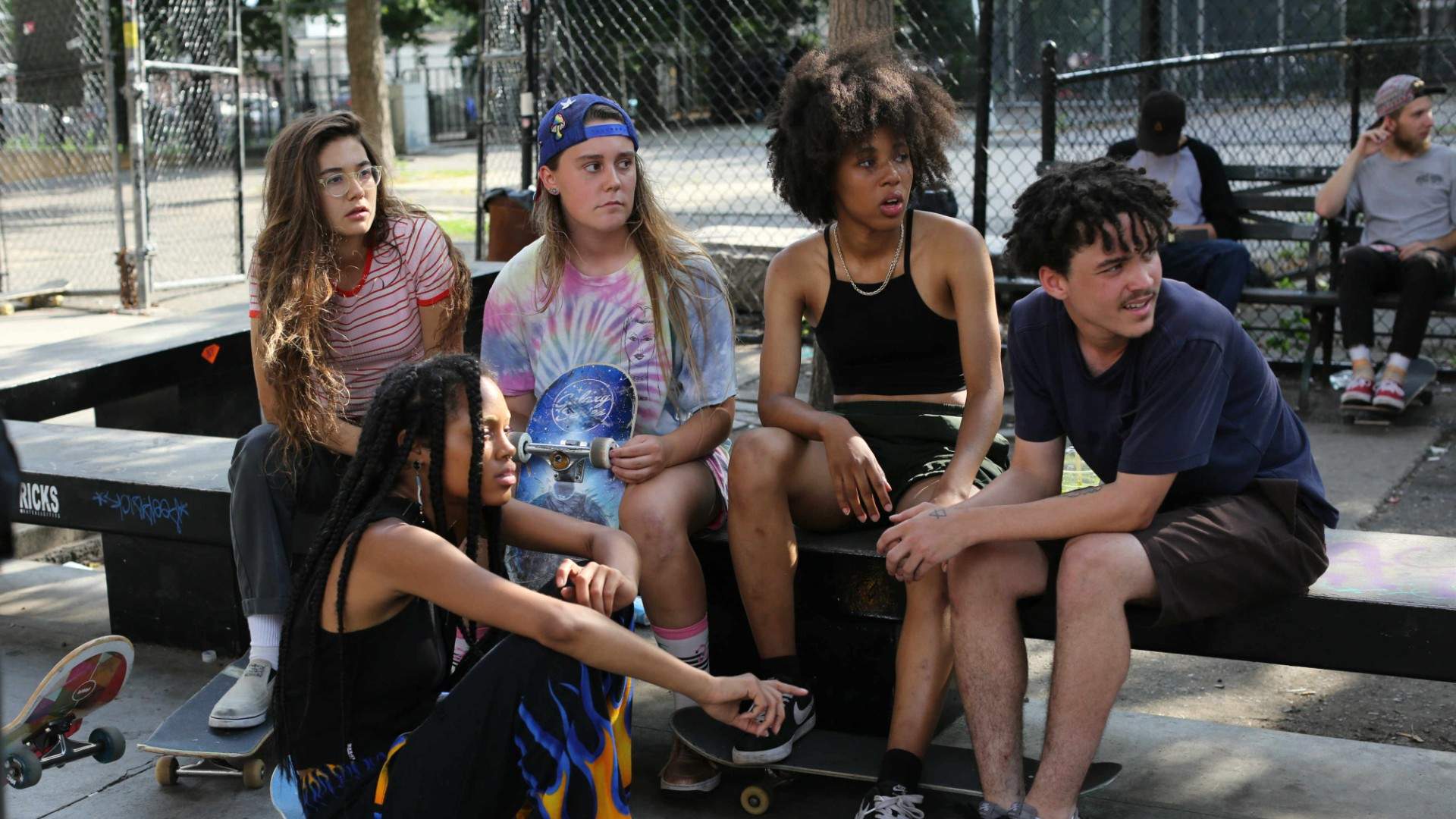Skate Kitchen
Focusing on an all-female skateboarding crew, Skate Kitchen makes all the right moves.
Overview
UPDATE, March 15, 2021: Skate Kitchen is available to stream via Google Play, YouTube Movies, iTunes and Amazon Video.

Skate Kitchen begins with a board, a banged-up pelvis and blood gushing down a leg. But stacking it once isn't going to keep Camille (Rachelle Vinberg) from shredding, grinding and nosesliding. Nor are stitches in her nether regions, or her mother's (Elizabeth Rodriguez) insistence that she give up her hobby. Instead, the film takes Camille gliding from the parks and pavements of Long Island to the streets of Manhattan, where a gang of girls skate like the city is their playground. They're the Skate Kitchen of Skate Kitchen. An all-female collective, they air, ollie and amble around town. They hang out, smoke joints, and shoot the breeze about anything and everything. They snap and record their tricks and kickflips, immortalising their antics on Instagram. And when they welcome Camille into the fold, it changes everything for the reserved, quiet 18-year-old.
Early in what proves a laidback but layered movie, filmmaker Crystal Moselle captures Skate Kitchen's leisurely vibe and the effect it has on her picture's teenage protagonist. The irrepressibly catchy beats of Junior Senior's 'Move Your Feet' take over the soundtrack as the girls walk, dance and skate their way through New York City, and Camille couldn't look happier. As well as sending the film's frames freewheeling along with the group, cinematographer Shabier Kirchner cloaks his images in a warm glow — the kind that exists in your mind when you're simply content, regardless of what your eyes actually see. It's an ethereal sequence, and yet it's also grounded in naturalism. Sunny, carefree, comforting, vibrant: that's just how being part of Skate Kitchen feels.
That's how watching Skate Kitchen feels as well, although Moselle's isn't a rosy coming-of-age portrait devoid of drama. Narrative-wise, the movie charts the push-and-pull that characterises Camille's life — first between the freedom of skating and the scolding of her overprotective mum, then between friends and family, and later between her new buddies and the wannabe photographer Devon (a flame-haired Jaden Smith) who they try to warn her away from. And, while the film marks Moselle's first fictional movie, Skate Kitchen itself is real. The endlessly fascinating Vinberg is one of its crew members. So is the scene-stealing Nina Moran, who plays the joker of the gang, as well as the affectionate Ardelia Lovelace, who becomes Camille's closest friend.
Here, art both imitates life and does its utmost best to represent it accurately — even when sometimes packaged with a visual sheen that'd do Sofia Coppola proud. It's unmistakably rare to see a film featuring such authentic and candid conversations between teen girls. Such a diverse yet nuanced female group, spanning different races, sexualities and personalities, is hardly regular screen fodder either. And that's before noting the obvious: that depicting young women as skateboarders, letting them carve out a place in a male-dominated domain, and spending time with them just kicking around is so uncommon that it's almost revolutionary. Indeed, that's exactly why the movie's dreamy aesthetic is such a fitting choice. Until now, a film set in this world — that's intent on fighting back against gendered expectations, and that seems so achingly real — was basically a dream.
Moselle knows a thing or two about stepping into an overlooked or undiscovered realm and revealing it to the masses. In 2015, her documentary The Wolfpack was a festival circuit hit, centring on seven home-schooled New York siblings — six boys and their sister — who were virtually forbidden to leave the house by their strict father. To experience the outside world, the factual flick's subjects escaped into movies, which they not only devoured on DVD but re-enacted and re-staged in an elaborate fashion. Skate Kitchen is The Wolfpack's fictionalised female-focused counterpart in many ways, and it also sees Moselle take her doco's core idea to the next level. There, cinema helped a sheltered family feel like they existed. Here, skateboarding does just that for a lonely soul, while the overall film will provide the same sensation for anyone who has ever been a teenage girl.





